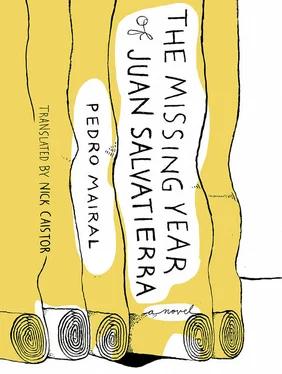“Good morning,” I said, loudly and in a friendly voice, trying to reassure him, because I could understand that he wasn’t thrilled to see two intruders standing there waiting for him outside his home, like ghosts. “We’re looking for Fermín Ibáñez.”
“Fermín Ibáñez?” he said, and we saw his dark-skinned face.
“Is that you?”
“No, Fermín was my uncle,” he said. “He died some time ago.”
“Are you the nephew?” asked Luis, although it was obvious.
“Yes,” he said. “What is it you were after?”
“We wanted to know whether your uncle Fermín still had a roll of canvas our father Juan Salvatierra painted. A roll this big,” I said, spreading my arms. “A canvas with drawings on it.”
The guy kept staring at us.
“Your uncle and our father were friends,” I said.
Less suspicious by now, he maneuvered his boat into the bank. He climbed out, tied a piece of rope round a fallen tree trunk, slung a sack over his shoulder and came up to where we were standing. He didn’t offer his hand.
“Do you have any idea if your uncle had that roll?” Luis asked impatiently.
“Yes, he did have it,” said the man. “He kept it over there in the bus engine, wrapped in sacks. Then he went to jail and died.”
“So where is it now?”
“I gave it away years ago.”
“You gave it away?”
“Yes, to Soria, the boss of Los Lanares near here. He never paid me. He said he was going to give me a mare and her foal, but he never did.”
Ibáñez tipped the contents of his sack onto the sand. Slimy looking fish fell out: a surubí and several sábalos . He started cleaning them right there, in the water. Barely visible beneath the surface, tiny fish nibbled at the innards as they fell.
“Do you know if that Soria fellow kept it?”
“No, I don’t… He said he wanted it for decoration.”
Ibáñez finished gutting the fish and, seeing that we made no move to leave, invited us to eat with him.
“It’s not luxurious, but there’s plenty for everyone. I’ve got some wine as well.”
Luis said a taxi would be coming for us in a short while. I would have gladly accepted the offer. Ibáñez passed some warm wine around in a mug.
As he lit the fire he told us that as far as he could remember the roll was kept under the hood of the bus when he was a boy. On one occasion he had been curious to see what it was, but his uncle had driven him off with his whip. This place had once belonged to the municipality, which used it to collect brushwood for use in road building. Fermín Ibáñez had been taken on to look after the machinery, and he was allowed to live in the old bus. Then the brushwood ran out, and the machines were taken elsewhere. His uncle had gone on living there for many years, before he was arrested for killing a man south of Paysandú in a bar room brawl. He had died in prison. By then his nephew was already settled in the bus. Later on, the spot began to be known for its fishing, and for a while he ran a drinks stall and a barbecue. Later still, the Day of the Fisherman was celebrated there. People came to it from all over, even from Argentina and Brazil. Ibáñez told us that during one of these celebrations he had unrolled the canvas to show it and Soria, who had just bought the Los Lanares ranch, offered to exchange it for a mare and foal. Soria was crazy about horses and according to Ibáñez part of the canvas depicted some rural horse races. Fifteen years old at the time, Ibáñez had accepted Soria’s offer, and helped load it in the trunk of his car, but never got anything in return. He used to occasionally run across Soria, and the old man always said: “I’m putting aside a nice little mare for you,” and yet he never kept his promise. Soria had died five years earlier; his children started a lawsuit over the property with some creditors, and it was now abandoned.
“Are you sure there’s nobody there?”
“The only caretaker lives at the entrance to the property, and he’s always either drunk or in town.”
It took us some time to make up our minds, or rather it took me time to convince Luis, who at first didn’t want to know anything. In the end he reluctantly climbed into the dinghy: we had let the taxi go back, and to him that was like burning our bridges. Ibáñez took us downstream to the Los Lanares ranch. Possibly because the wine had gone to my head I felt almost happy, especially watching my brother the notary sitting in this muddy little craft, clinging to the sides and constantly readjusting his glasses with a quick jerk of his thumb as if he was afraid they would fall in the water.
We followed the coastline without having to row: the current took us along slowly but surely. After a while, eucalyptus and pine trees started to replace the native thorn bushes. Ibáñez told us the house was behind the screen of trees, and took us in to the bank. We clambered out at a small jetty where only the wooden posts were left standing.
“I’ll be back later,” said Ibáñez, rowing off upstream.
We stood there, looking around. Now we really had nothing but our feet to rely on. We began to walk slowly away from the river. Panting with exhaustion, Luis kept saying things like: “We have to ask permission first,” “If it’s locked we’ll leave,” “I don’t know what on earth we’re doing here,” “It’s me who’s the idiot for following you.” All of a sudden the house appeared among the trees: a big stone building with a tower and balconies. We came to a halt.
“There must be people in there,” said Luis.
We crossed the grass of what had once been the lawn around the house, jumping over fallen tree trunks, dry branches, and through thistle bushes that came up to head-height. Every so often we stopped so as not to make any noise on the leaves and to listen. But no dogs barked; the only sound was a buzzing like cicadas or wasps that seemed to be coming from the ranch house. Then we startled a tinamou bird, and it startled us back with its cries and beating wings. We reached the veranda. Some of the guttering had been brought down by storms, tufts of grass were growing through the floor tiles, there were bird nests, earth. It looked completely deserted. We walked around the house. At the front, Luis clapped his hands, then knocked on the door. Nobody answered. He pushed, but it was locked.
We tried to peer through the window bars, but could only make out the vague shapes of furniture in the gloom. We went around the house again. I found a wooden door that had a half-rotten lower part. I bent down to see if I could tear a slat off. Luis wanted to leave, but I pretended I didn’t hear him.
“What are you going to do now? Go in and steal?”
That incensed me. I straightened up and told him I wasn’t going to steal anything; on the contrary, I was going to recover something that had been stolen from us.
“If you’re going to moan at me the whole time, I prefer you to go. Right now,” I said. He walked away among the thistles.
I tried to loosen the door. I kicked it, barged it with my shoulder. I took out all my pent-up anger at my brother on the door. This went on for a good while. Whenever I grew tired, I would pause, then start again. Now that I’d gotten this far, I wasn’t going to let a stupid old door stand in my way. I insisted, but got nowhere apart from raising a few splinters. All of a sudden a big piece of wood landed beside me: I jumped to one side. Luis had reappeared with a huge branch. Without a word, he pushed it through the rotten wood to gain some leverage. Between the two of us we managed to smash in the bottom part of the door, until there was a hole large enough for someone to crawl through.
“You first,” he said, so I pushed my way in.
Читать дальше












